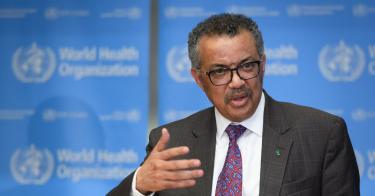Some issues transcend politics—or they should. The role of the World Health Organization in combating the current pandemic is one of them.
The White House has unveiled detailed complaints about the WHO in a new letter from the president. They are serious complaints, and well-justified.
This is, after all, a deadly serious situation. Pandemics are dangerous. The world has had a number of scares in recent years, including SARS, Ebola and H1N1.
Nations have increasingly looked to the WHO to quarterback the sharing of information, distributing recommendations and facilitating coordination. After the SARS outbreak in 2003, the WHO adopted new international health regulations, detailing reporting requirements for future pandemics.
Yet, at the height of the most consequential plague in modern history, the U.S. is threatening to yank all support from the organization—and with good reason.
Consider its approach to China. Beijing delayed reporting under the guidelines established in international health regulations by weeks, perhaps months - time that other nations could have used to prepare for the pandemic. China allowed tens of thousands people to leave the country, knowing they could be highly contagious.
These contributed to the spread of COVID-19. Indeed, some of the first cases outside of China were linked to Chinese tourists. Meanwhile, China focused on playing politics by blocking Taiwan's efforts to participate as an observer in the WHO, despite its world-class health system and its effective response to the pandemic.
The WHO, meanwhile, took the statements of the Chinese government at face value. It even defended the regime's actions—statements and actions that we now know to be false and self-interested. These were inexcusable oversights.
There are deeper problems with the WHO. The organization over-invests in health and safety issues that have little to no prospect of posing a threat to spread from one country to another. The WHO dedicated less than 15% of its budget in 2018 and 2019 to detecting and responding to global pandemics. Arguably, this should have been the organization's top priority.
Meanwhile, the organization supports abortion, and spends tens of millions on traffic safety, substance abuse, gender issues and a host of other issues that have nothing to do with the deadly serious issues that threaten to spread from one country to another—issues the WHO should be focusing on.
The president has drawn a red line, stating in his letter that if the WHO did not clean up its act in 30 days, the U.S. would withdraw from the organization. Detractors can dispute the president's timing and tactics, but what cannot be disputed is that the WHO failed when it was most needed.
The United States was one of the first and most vocal critics of the WHO and China's mendacious influence. That's important. That demonstration of global leadership helped create a safe space for other nations to step up and risk China's wrath by openly complaining about Beijing's behavior on the global stage.
One concrete result of American leadership is the number of countries that have called for Taiwan to be readmitted to the WHO. The director-general of the WHO has dodged that demand, claiming that members would have to vote, and there is no consensus. That is just more cover for China.
There does not to be a vote for Taiwan to be invited to observe WHO meetings. In fact, Taiwan had observer status from 2009 to 2016. It was revoked at China's insistence. The U.S. has now rightly doubled down in pressing the case for Taiwan.
Many countries have also echoed the U.S. in demanding an independent investigation of the WHO response to the COVID pandemic, which culminated in the WHO adopting a resolution calling for that investigation.
Would the world have stood up to China's meddling in the WHO if the U.S. hadn't led the way? It seems unlikely. The U.S. has led on an important issue—and made a difference.
This piece originally appeared in the Lincoln Journal Star




